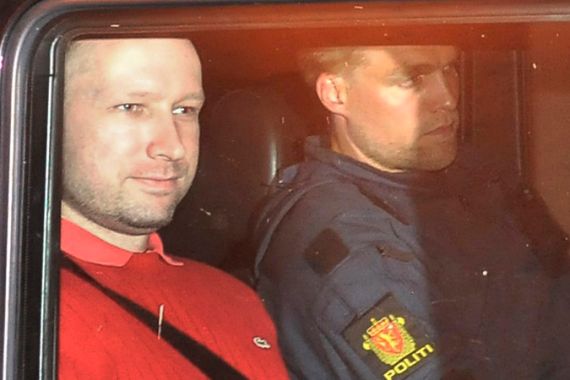Norway: Rise of right-wing extremism
Anders Breivik wreaked havoc in Norway when he bombed Oslo’s government district, then opened fire on a youth camp.

 |
| When news of the attacks in Norway first broke, many quickly blamed them on Muslim ‘terrorists’ [GALLO/GETTY] |
On July 22, 32-year-old Norwegian Anders Behring Breivik set off a bomb in Oslo’s government district, killing eight, and then went to a youth camp in nearby Utoeya, where he opened fire on teenagers – killing 69.
The unfolding scenes of horror seemed to go on forever as frantic parents tried to figure out if their children had survived the carnage. Throughout the afternoon, interviews with wild-eyed teens who had managed to run or swim away from the attack came in, brief and chilling in the plain facts they spoke.
In the meantime, pundits and security experts lined up to share their theories as to who was responsible and why.
The only answer many could come up with was that al-Qaeda, or a similar group, must have carried out the twin attacks. “Jihadists.” “Muslim fundamentalists.” Surely anyone capable of such violence had to be part of the global “Them” – the bad guys on whom the Bush administration had declared its “War on Terror”.
What quickly became apparent is the truth that has been forgotten since the 2001 attacks and the ensuing anti-Islam hysteria: That no one race, religion or nationality owns the franchise on terror and violence.
The realisation that the responsible party was a local man who identified himself as a Christian, a right-winger with ultra-nationalist leanings who posted anti-Muslim rhetoric online, came as a shock to many.
The Muslim community in Oslo took a double hit that day – first from the attacks themselves and then from being unjustly blamed for them. Their response was to fling open the doors of their mosques and community centres, engage in dialogue and, most importantly, mourn the tragedy.
Muhammed Tayyib, the head of one of these centres, told Al Jazeera at the time that Muslims there were “reacting [to the attacks] as Norwegians, not as outsiders”.
Breivik, said Norwegian prosecutors in November, belongs in psychiatric care and not a prison, a conclusion some disagree with given the clear, calculated manner in which he planned the massacre. Norway’s Board of Forensic Medicine agreed with the evaluation, although Breivik’s trial in April will ultimately determine his guilt.
Breivik’s case highlights another uncomfortable truth: That the West too, has its extremists. His father, retired diplomat Jens Breivik, told a German magazine that his son was the “worst terrorist since World War II”.
The attacks were designed to end a so-called centuries-long Muslim colonisation of Europe, Breivik said in a 1,500-page manifesto released on the internet after the incident. But many in Europe worry that what the attacks actually represent is a manifestation of a right-wing ideology of intolerance and exclusion that is slowly becoming more mainstream in the region.
Election and referendum results in favour of right-wing parties in countries such as Sweden, Spain, Italy and the Netherlands could indicate a growing trend in the New Year that the ideology of these groups is becoming institutionalised.